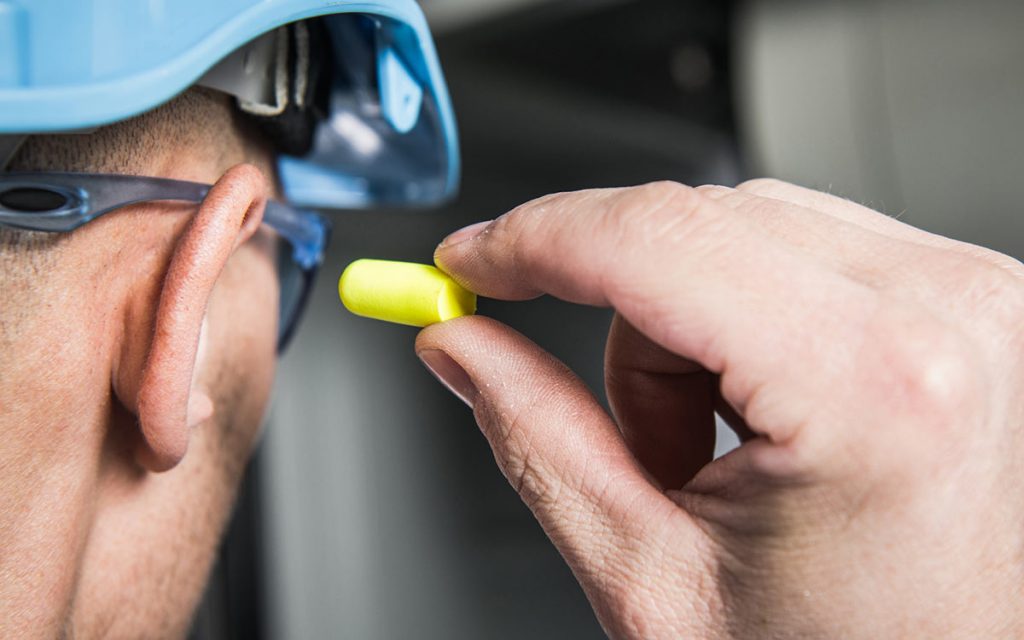If you’re one of those guys with the flashlights directing airplanes on a runway, it’s not a surprise that you need to wear hearing protection at work. You stand next to roaring jet engines all day! We all know there are some loud–really loud–jobs that require constant hearing protection. The problem is that there are plenty of quieter jobs that can pose dangers to your hearing, too.
Most people significantly underestimate the threshold at which loud noises can cause long-term damage to their hearing. It’s not just the massive, roaring jet engine that can create problems–it’s the lawnmower engine, too. That’s why it’s important to know when you need to take your hearing protection seriously–especially on the job.
Occupations where hearing protection is a good idea
Generally speaking, hearing protection regulations are created and enforced under the guidance of the government. If you’re in the United States, it falls under the Occupational Health and Safety Administration (OSHA), and if you’re in Canada, it’s The Centre for Occupational Health and Safety. They’re the ones that put have all those posters up in your office break room, and they mandate hearing protection when certain levels of noise are reached.
Typically these agencies require that any workplace in which employees are exposed to the equivalent of 85 dB of sound (roughly as loud as your blender or garbage disposal) over an eight-hour-equivalent time period provide guidance and regulations to protect their employees’ hearing. But these are minimum safety requirements.
This means that there are plenty of jobs where hearing protection is a good idea, even if it’s not required. For example:
- Lawn care: We don’t tend to think of a lawnmower or weed wacker as excessively loud machines, but if you’re spending eight hours a day cutting grass, hearing protection could do you a world of good.
- Driving: Spend most of your day on the road? Whether you’re traveling through the open country or the big city, the sounds of nearby traffic or your tires on the pavement can add up. Hearing protection that doesn’t compromise your sensory awareness might be necessary to protect your hearing health.
- Playing music: Often, when we like a certain style of music, we do everything we can to listen to that music loudly. Musicians are exposed to even more noise as they often perform in front of the speakers. It’s not a shock that many musicians will often develop hearing problems later in life.
- Hospitality: Waiting on tables in a noisy restaurant all day? Or maybe you’re in the back of the house, washing dishes all night. These are two very common occupations that, while they don’t require hearing protection, certainly have employees who could benefit from such protection.
And then there’s the obvious
Of course, there’s also the obvious. If you work on a super loud factory floor, you need to wear hearing protection. If you spend most of your day standing next to a roaring jet engine, you need to wear hearing protection. You get the idea.
Modern hearing protection–either ear muffs or earplugs–often has built-in features, such as radio communication, that can help preserve workplace safety. In other words, if you work in an exceptionally loud environment, taking hearing protection seriously can improve your hearing health and your overall safety.
Assess the noise level of your work
The point here is that hearing protection is not a concern only for those who spend all day on the factory floor. If you spend eight to ten hours even in a moderately noisy environment, you might want to think about acquiring some hearing protection, even if it’s not officially recommended.
Unfortunately, your ears don’t have a built-in decibel meter (sure, they can use pain to tell you when something is too loud–but the pain threshold is quite a bit higher than the damage threshold). Luckily, technology has come running to the rescue.
If you have a smart device–and most of us do at this point–then you have a decibel meter. There are a wide variety of free apps that can monitor the sound levels around you. These apps make it easy to see when–and how often–your ears are entering the danger zone. Once you know the danger, you can take steps to protect your ears, no matter where you happen to work.



